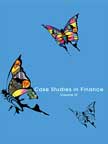A Note on Adjustable Rate and Fixed Rate Mortgage Plans in the US
|
|
ICMR HOME | Case Studies Collection
Case Details:
Case Code : FINC048
Case Length : 14 Pages
Period : 1990-2007
Pub. Date : 2007
Teaching Note :Not Available
Organization : -
Industry : Banking
Countries : US
To download A Note on Adjustable Rate and Fixed Rate Mortgage Plans in the US case study (Case Code:
FINC048) click on the button below, and select the case from the list of available cases:

Price:
For delivery in electronic format: Rs. 300;
For delivery through courier (within India): Rs. 300 + Shipping & Handling Charges extra
»
Finance Case
Studies
» Short Case Studies
» View Detailed Pricing Info
» How To Order This Case
» Business Case Studies
» Case Studies by Area
» Case Studies by Industry
» Case Studies by Company

Please note:
This case study was compiled from published sources, and is intended to be used as a basis for class discussion. It is not intended to illustrate either effective or ineffective handling of a management situation. Nor is it a primary information source.
Chat with us

Please leave your feedback

|
|




<< Previous
This technical note provides insights into the adjustable
rate mortgage (ARM) and fixed rate mortgage (FRM) products. It describes the
different parts of ARM, types of ARM, points that should be taken into account
before opting for an ARM, circumstances under which ARM is advisable, and the
advantages and risks involved in ARM. The latter portion of the note talks about
the FRM. It also discusses the positive and negative attributes of FRM.
Defining Mortgage Rate Plans
|
There are two popular mortgage rate plans offered by banks
and financial companies to provide residential and commercial real estate loans.
These include the adjustable rate mortgage (ARM) and fixed rate mortgage (FRM)
plans.
ARM, also known as the variable rate mortgage or floating rate mortgage, is a
loan in which the interest rate1 is adjusted periodically on the basis of an
index based on a particular benchmark. This plan had been developed to ensure a
steady margin for the banks and financial companies, whose own cost of funding
would usually be related to the financial index.
|

|
Consequently, payments made by the borrower may change over
time with the change in interest rates. However, in the case of FRM, the
rate of interest remains usually fixed during the entire tenure of the loan.
|
|
Despite the
fact that the amount of principal and the interest paid each month may
vary in the case of each equated monthly installment (EMI), the total
payment remains unchanged, which makes budgeting easy for the borrowers.
Basic Parts of ARM
An ARM can be divided into four basic parts - index,
margin, adjustment period, and interest rate.
Index
The interest rate on ARM plan is tied to a financial index (index). This
index is essentially a movement of an objective economic indicator. |
This index can be any one of the common indices that the
lender ties the interest rate with. Some of the common indices include:
• Constant Maturity Treasury (CMT or TCM): Constant Maturity Treasury
rates or Treasury Yield curve rates depend on the market yields of US treasury
securities and are provided by the Federal Reserve Board. These are calculated
from quotes obtained by the Federal Reserve Bank of New York, from five leading
US Government security dealers. The market yields are read from yield curve at
maturities ranging from 1 month to 20 years. The US treasury interpolates the
yields from daily yield curve of treasury securities. The curve is based on
closing market bid yields of actively traded securities traded in the OTC
market. (Refer to Exhibit I for the Treasury Yield Curve Rates in June 2007).
A Note on Adjustable Rate and Fixed Rate Mortgage Plans in the US
- Next Page>>
|
|










